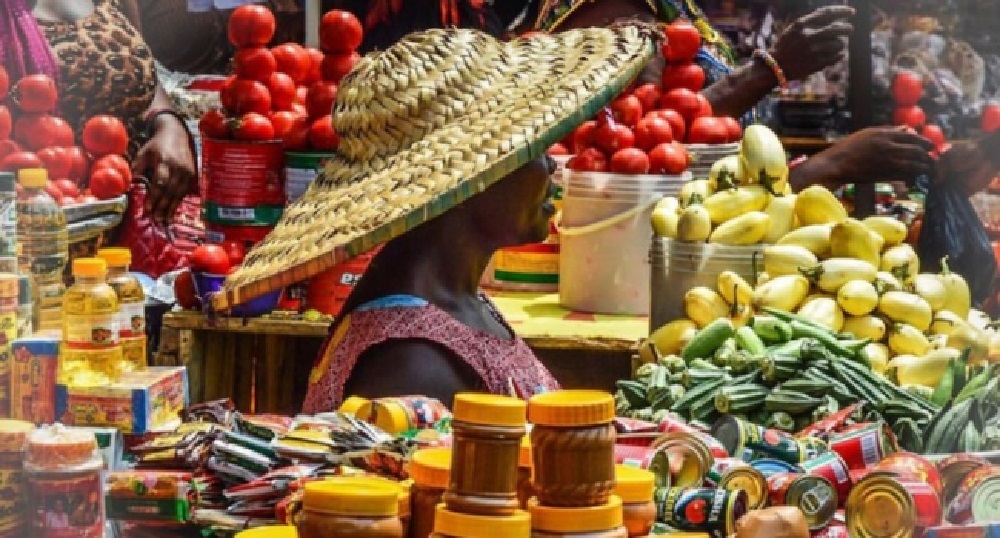Economy
Ways & Means hike: CBN may loan over N746bn to FG

The Central Bank of Nigeria may print or wire over N746bn as a loan to the Federal Government based on the Ways and Means provision of the CBN Act.
In the Act, funds that the apex bank should provide to the Federal Government through Ways and Means is five per cent of the Federal Government’s previous year’s revenue.
Last week, the National Assembly raised the maximum borrowing percentage in the Act from five per cent to ten per cent.
Data from the National Bureau of Statistics on Saturday indicated that as of the third quarter of 2023, the Federal Government’s actual aggregate revenue was N7.46tn.
Based on the hike in Ways and Means funding approved by the National Assembly, the Federal Government would get no less than N746bn from the apex bank through the funding scheme.
The Ways and Means Advances are loan facilities used by the CBN to finance the government during periods of temporary budget shortfalls and are subject to limits imposed by law.
According to Section 38 of the CBN Act, 2007, the apex bank may grant temporary advances to the Federal Government with regards to temporary deficiency of budget revenue at such rate of interest as the bank may determine.
The Act read in part, “The total amount of such advances outstanding shall not at any time exceed five per cent of the previous year’s actual revenue of the Federal Government.”
The maximum borrowing percentage in the Act was hiked from five per cent to ten per cent by lawmakers last week, as they also rescinded and re-enacted the 2024 Appropriation Act through an amendment bill sponsored by leaders of both chambers.
In the Senate, the increase in the threshold was achieved through the consideration and passage of a bill sponsored by its Leader, Senator Opeyemi Bamidele (APC Ekiti Central).
In his lead debate, Senator Bamidele explained that the bill seeks to amend the CBN Act to increase the total CBN advances to the Federal Government.
He stated that the bill aims to help the government meet its immediate and future obligations due to the increasing need for funds to finance budget deficits and other expenses.
“The Central Bank of Nigeria’s advances to the Federal Government are essentially loans that the Central Bank of Nigeria provides to the government to help it meet its financial obligations. These advances are typically short-term and are expected to be repaid by the government,” he said.
Senator Bamidele explained that the request to increase the threshold from five per cent to fifteen per cent of the previous year’s revenue was made to provide immediate funds to address budget shortfalls, finance essential government expenditures, maintain financial market stability, inject money into the economy, and support critical sectors like agriculture, healthcare, and infrastructure development.
He said this would also lower government borrowing costs compared to traditional borrowing methods.
During the debate, many Senators supported the amendment but argued that the 15 per cent should be reduced to ten per cent.
However, the Federal Government had in the past taken excessive advantage of Ways and Means loans.
The administration of former President, Major General Muhammadu Buhari (retd.), had come under heavy criticism for abusing the Ways and Means.
From 2014 to 2023, the Federal Government collected N30tn through Ways and Means from the CBN without National Assembly appropriation.
Following this, the Senate set up an Ad-hoc committee led by Senator Isah Jibrin (APC, Kogi East), to carry out investigations.
Commenting on the development, financial analysts said the CBN would have to print more cash to meet the demands for increased funds through the Ways and Means advances, pointing out that this could further raise inflation.
An economist, Paul Alaje, expressed concern over the increase in Ways and Means advances to the Federal Government from five to ten per cent.
He said the move would lead to increased pressure on the CBN to print more money, potentially affecting the economy adversely.
Another economist at Lotus Beta Analytics, Shadrach Israel, also expressed concern over the recent increase, noting that it could lead to an increase in money supply and, subsequently, inflation.
He, however, acknowledged that the current upward trend in interest rates might mitigate the effects of the increase.
Recall that the Minister of Finance and Coordinating Minister of Economy, Wale Edun, said the N22.7tn printed by the CBN through Ways and Means overdraft for the Federal Government from 2015 to 2023, under former President Buhari, threw the country into the current inflation.
Economy
Volvo announces termination of 800 U.S. workers, cites tariff, market decline

Volvo Group has announced plans to lay off up to 800 workers at three of its U.S. facilities over the next three months, citing ongoing market uncertainty and declining demand exacerbated by tariffs introduced under the administration of President Donald Trump.
The affected locations include the Mack Trucks plant in Macungie, Pennsylvania, as well as Volvo Group sites in Dublin, Virginia, and Hagerstown, Maryland.
In a statement on Friday, Volvo Group North America confirmed that between 550 and 800 employees would be impacted.
The company, a subsidiary of Sweden’s AB Volvo, employs nearly 20,000 people across North America.
The layoffs come amid wider turmoil in the automotive and manufacturing sectors, as shifting U.S. trade policy and a series of tariffs continue to drive up production costs. Economists have pointed to the uncertainty surrounding Trump’s trade strategy as a factor undermining both business and consumer confidence, with concerns mounting over a potential economic slowdown or recession.
According to Volvo, the company is grappling with a decline in heavy-duty truck orders, driven by instability in freight rates, anticipated regulatory changes, and the growing financial burden of tariffs. “We regret having to take this action, but we need to align production with reduced demand for our vehicles,” a company spokesperson stated in an email quoted by Reuters.
Volvo’s announcement marks another blow to an industry already navigating a complex web of supply chain challenges and fluctuating market conditions, with other manufacturers also warning of potential cost hikes and disruptions tied to global trade disputes.
Economy
Inflation surged to 24.23% due to escalating cost of living

Inflationary pressure has reappeared as Nigerians grapple with increases in average costs of basic food items and energy.
For the first time after the rebasing of the Consumer Price Index (CPI), headline inflation spiked in March to 24.23 per cent – 105 basis points above the 23.18 per cent recorded in the previous month.
The National Bureau of Statistics (NBS) yesterday indicated that the rate of increase in the average price level was higher in March than the level in February.
In January, the NBS updated the weight and price reference periods in calculation of the CPI to make the inflationary gauge more reflective of changes in consumption patterns and the economy generally.
The rebasing did not only brought the base year closer to the current period from 2009 to 2024, it also introduced some critical methodology changes to improve the computation processes.
After the rebasing, inflation dropped from 34.80 per cent in the pre-rebased period of December 2024 to 24.48 per cent in January 2025. It dropped further to 23.18 per cent in February.
In its latest report, NBS recorded 186 basis points changes between the monthly inflation rate, with the month-on-month rate rising from 2.04 per cent in February to 3.90 per cent in March.
The NBS attributed the spike to the rise in costs of food and alcoholic beverages, fuels and electricity, among other items.
Analysts at CardinalStone said the resurgence was due to renewed foreign exchange (forex) pressures amid heightened global risk-off sentiment.
They pointed at foreign portfolio investments (FPIs) outflows and increased dollar demand, which saw naira dropping by 2.4 per cent in March.
Experts also cited increase in price of Premium Motor Spirit (PMS) or petrol, following the temporary suspension of the naira-for-crude swap arrangement.
Food inflation rate stood at 21.79 per cent in March 2025. The composite food index decreased to 21.79 per cent from 23.51 per cent.
Core inflation, which excludes volatile agricultural produce prices and energy, rose to 24.43 per cent from 23.01 per cent.
Specifically, the month-on-month food inflation rose by 50 basis points from 1.67 per cent in February to 2.18 per cent in March.
The NBS attributed the increase in food inflation to increases in the average prices of basic food items including ginger, garri, broken rice, honey, crabs, potatoes, plantain flour, periwinkle and pepper amongst others.
On a state-by-state basis, food inflation was higher in Oyo with 34.41 per cent; Kaduna (31.14 per cent) and Kebbi (30.85 per cent).
On the other side, the 9.61 per cent recorded by Bayelsa; Adamawa (12.41 per cent) and Akwa Ibom (12.60 per cent), were the lowest inflation rates.
Analysts expressed concerns that the resurgent inflationary pressure might lead to renewed tightening stance by the Central Bank of Nigeria (CBN).
CBN Governor Dr. Olayemi Cardoso, had at the end of the first Monetary Policy Committee (MPC) meeting in 2025, reiterated the apex bank’s commitment to orthodox monetary policies, noting that the apex bank’s stance will be reflective of the inflationary trend.
With inflation rate dropping in February, the MPC had decided to maintain all key monetary policy parameters, including the Monetary Policy Rate (MPR) at 27.50 per cent, the asymmetric corridor around the MPR at +500/-100 basis points, the Cash Reserve Ratio (CRR) at 50.00 per cent for Deposit Money Banks and 16.00 per cent for Merchant Banks, and the Liquidity Ratio at 30.00 per cent.
Clarifying the impact of the rebased CPI, Cardoso had explained that the lower inflation figure should not be misinterpreted.
He underlined the need to analyse more data before drawing comparisons, noting that the CBN is currently assessing the figures and will provide further guidance in due course.
The CBN boss stressed the critical importance of collaboration between monetary and fiscal authorities in sustaining recent economic improvements.
Addressing concerns about the impact of elevated borrowing costs on economic growth, the CBN governor assured that the apex bank’s primary objective is to stabilize the foreign exchange and financial markets.
He expressed confidence that such stability would attract increased foreign investments, stimulating the much-needed economic growth.
Cardoso also highlighted the competitiveness of the Nigerian currency, which has spurred growing interest from international investors.
Economy
SEE Current Black Market Dollar (USD) To Naira (NGN) Exchange Rate

The exchange rate between the US dollar and the Nigerian naira continues to draw significant attention from individuals and businesses alike, especially those involved in international trade and remittances.
On Saturday, April 12, 2025, activity in the Lagos parallel market, commonly known as the black market shows that the buying rate for one US dollar stands at ₦1570, while the selling rate is ₦1575.
These figures are sourced from traders and Bureau De Change (BDC) operators who are active in key currency exchange hubs across Lagos.
Why the Black Market Rate Matters
Although the Central Bank of Nigeria (CBN) does not officially recognize or support the use of the black market for foreign exchange transactions, many Nigerians still rely on it due to difficulties in accessing forex through official banking channels. Issues such as limited availability, long processing times, and strict documentation requirements have made the black market a more accessible, albeit riskier, alternative.
CBN’s Official Position
The CBN continues to warn against participating in parallel market trading, stating that such activities undermine the stability of the national currency. The apex bank urges those in need of foreign currency to apply through authorized financial institutions, which are mandated to follow official exchange rates.
Nonetheless, the disparity between the official and unofficial markets persists, often influenced by market forces such as demand, inflation, and fluctuations in Nigeria’s foreign reserves.
Latest Exchange Rates Overview
Black Market (Parallel Market) Rate
Currency Pair Buying Rate Selling Rate
USD/NGN ₦1570 ₦1575
CBN Official Rate
Currency Pair Highest Rate Lowest Rate
USD/NGN ₦1630 ₦1570
Key Notes for Forex Users
The exchange rates in the black market often differ slightly from one location or dealer to another due to market volatility and negotiation margins.
Rates can also fluctuate within hours based on economic news, government policies, and global financial trends.
It is advisable to compare rates from multiple sources before conducting any large transactions, especially in volatile markets.
What This Means for Nigerians
The current forex rates reflect continued pressure on the naira, and many analysts believe that inflation, reduced oil revenue, and inconsistent monetary policies are key factors driving the demand for the dollar. For everyday Nigerians, this means the cost of imported goods remains high, and businesses dependent on international suppliers face growing challenges.
Until forex supply stabilizes through official channels, the black market will likely remain a major player in Nigeria’s currency landscape.
-

 News20 hours ago
News20 hours agoBREAKING! Gov Oborevwori finally dumps PDP
-

 News22 hours ago
News22 hours agoLagos school owner nabbed for concealing r3pe of eleven girls by teacher
-

 News23 hours ago
News23 hours ago18 Africans among cardinals to elect new Pope
-

 News16 hours ago
News16 hours agoDelta to transform into complete APC state as 25 PDP Local Government Chairmen set to defect
-

 News22 hours ago
News22 hours agoPilgrims Arrive As Lying In State Begins for Pope Francis
-

 News24 hours ago
News24 hours agoCustoms Generates N1.7trn Revenue, Seizes N7.6bn Goods in Q1
-

 News6 hours ago
News6 hours agoINSECURITY! Enough is enough, Tinubu tells security chiefs, NSA
-

 News24 hours ago
News24 hours agoNigeria’s rebased inflation to hit 37% in 2026 – IMF






